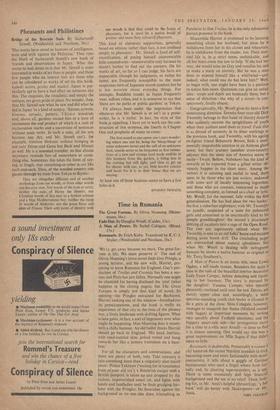Time in Rumania
Fade Out. By Douglas Woolf. (Calder, 13s.) Rosemarie. By Erich Kuby. Translated by R. C. J. Muller. (Weidenfeld and Nicolson, 16s.) 'WE'LL get away because we must. The great for- tune is life. We must preserve it.' The end of Olivia Manning's latest novel finds Guy Pringle, a young lecturer, and his new wife, Harriet, pre- paring to leave Rumania for England. Guy's pro-
duction of Troilus and Cressida has been a suc-
cess and Paris has just fallen. Normally one might be chastised for having disclosed the 'plot' (what
happens in the closing pages), but The Great Fortune is simply not that kind of novel. Its opening—the Pringles entrained for Bucharest,
Harriet looking out of the window—foreshadows its preoccupations, and the book is really an experience of that city at the time of the phoney war, a lively landscape with drifting figures. What is seen gains, in fact, a sort of hegemony over what might he happening. Miss Manning does it mostly with a chilly humour. An old buffer thinks Harriet should go back to England. 'His head, hairless, with toad-mottled skin. jerked round and hung towards her like a lantern tremulous on a bam- boo.'
For all the characters and conversations, and there are plenty of both, only Yaki converts it into something more than a singularly alert travel piece : Prince Yakimov (`waiting for m'remittance from m'poor old ma'), a Bunterish emigre with a British passport, is taken up and dropped by the vicious, impoverished smart set, and fights with hotels and landladies until he finds grudging har- bour with the Pringles. He flourishes against the background as no one else does; triumphing as Pandarus in that Troilus, he is the only substantial human presence in the book.
Meanwhile Harriet is presumed to be learning something about her husband, but since he is withdrawn from her in his classes and rehearsals, he is withdrawn from the reader, too. Their mar- ried life is, in ,a strict sense, unthinkable, and all her hints come too late to help. 'If she had her way, she would seize on Guy and canalise his zeal to make a mark on eternity. But he was a man born to expend. himself like a whirlwind—and, indeed, what could one do but love him?' Well, to begin with, one might have been in a position to notice him more. Quotation can give an unfair idea : scope and depth are hesitantly there, but a sense of direction—the why of a novel—is con- spicuously, fatally absent.
Geographically, Mr. Woolf gives his hero a firm summoning direction. Seventy-four-year-old Dick Twombly belongs to that band of literary dotards who suddenly recover the sprightliness of youth when their authors need them to travel. Fade Out is as devoid of necessity in its inner workings as the previous book, and Twombly, with his ageing ex-fighter friend Behemoth Brown, finds a senti- mentally improbable solution in an Arizona ghost town; but their journey (another cross-country odyssey that the sheer size of America seems to incite—Twain, Bellow, Nabokov) has the kind of rewards to be expected from a gifted writer ob- viously happier in the short story. Among the writers it is amusing and useful to read, there seem to be those who are just writers, endowed with some sort of locally interesting logorrhea, and those who are creators, concerned to shape something complete, as formed as a chair or lyric. Mr. Woolf. for the moment, falls within the first generalisation. He has had ideas for two books: the first a suburban nightmare, with Mr. Twombly en famine, suspected of • a taste for pubescent girls and concerned to be uncritically kind to his pimply granddaughter; the second a picaresque slotting of incidents into a saga of the Open Road. The two are ingeniously spliced when Mr. Twombly is sent to an old folks' home and escapes during atom bomb drill. The concluding pages are overexcited about natural splendours, but when Mr. Woolf is dealing with outrageous humans he shows a native humour as original as Mr. Terry Southern's.
A Man of Power is an ironic title, since Lewis Ogden, a self-made tycoon, flounders for quite a time in the toils of the beautiful interior decorator Lady Essex Cowper, before detecting and ripost- ing to her baseness. The story is pursued by the daughter, Vanessa Cowper, who remains pleasantly confused until near the end. Ddcors are mostly upper class and, accordingly, a most specious-sounding youth club leader is allowed 10 do a guru at the close. Miss Colegate, however, manages to vanquish her theme (Milford crossed with Sagan) at important moments by writing very sensibly about Tanfield situations; and the frippery smart-talk side—the protagonists move for a time to a villa near Amalfi—is done so that it is almost amusing. One would say this was a great improvement on Mile Sagan if that didn't mean so little.
Rosemarie is deplorable. Presumably a roman a clef based on the recent Nitribitt scandals (a trick becoming more and more fashionable with demi-
journalists), it tells about a gaggle of German businessmen who used a frigid whore both car- nally and, by planting tape-recorders, as a spY• There is some excessively dull high financial background and the sex is no relief. Those look•
ing for, in Mr. Amis's helpful phraseology, 'a hot book' will do better with Shakespeare—or Mr.
Amis. JOHN COLEMAN






































 Previous page
Previous page